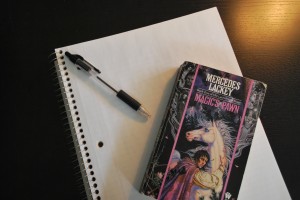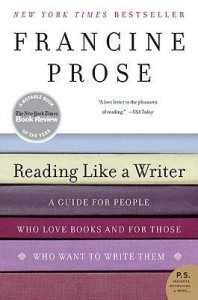 I've said before, I don't have a degree in writing. I took one creative writing class in high school, that's it. And I'm not really planning on going back to school. Yet I can study under masters of my craft like Mercedes Lackey, Tamora Pierce, Lois McMaster Bujold, and Terry Pratchett without budging from my library. I can improve my writing by reading and studying the authors I admire (not to mention practicing what I've learned).
What amazes me is how many people out there think to themselves “Hey, I could write a book” without having read anything but the morning paper over the last five years. Do you think Jacques Cousteau said “Hey, I could be a marine biologist” without ever having been to the beach? Reading familiarizes you with genre requirements, reader expectations, and above all, feeds your imagination. That last sounds cheesy, I know, but think of it like a linebacker. It can't do its job unless you feed it four course meals full of carbs and protein. Agent Kristin Nelson has said on her blog that she wishes she could demand authors submit a receipt with their manuscripts proving they've bought (and hopefully read) a book in the last month.
I've said before, I don't have a degree in writing. I took one creative writing class in high school, that's it. And I'm not really planning on going back to school. Yet I can study under masters of my craft like Mercedes Lackey, Tamora Pierce, Lois McMaster Bujold, and Terry Pratchett without budging from my library. I can improve my writing by reading and studying the authors I admire (not to mention practicing what I've learned).
What amazes me is how many people out there think to themselves “Hey, I could write a book” without having read anything but the morning paper over the last five years. Do you think Jacques Cousteau said “Hey, I could be a marine biologist” without ever having been to the beach? Reading familiarizes you with genre requirements, reader expectations, and above all, feeds your imagination. That last sounds cheesy, I know, but think of it like a linebacker. It can't do its job unless you feed it four course meals full of carbs and protein. Agent Kristin Nelson has said on her blog that she wishes she could demand authors submit a receipt with their manuscripts proving they've bought (and hopefully read) a book in the last month.
You can learn directly from your favorite authors. Study their words, their  language. Francine Prose calls this “close reading” in her book Reading Like a Writer (though I don't recommend close reading this book unless you really like literary fiction and classics and/or plan on writing literary fiction).
language. Francine Prose calls this “close reading” in her book Reading Like a Writer (though I don't recommend close reading this book unless you really like literary fiction and classics and/or plan on writing literary fiction).
What books did you absolutely love? What was it about them that made your heart beat faster? Why do you pick that one particular book up over and over again like a favorite blanket? How can you recapture the feeling you get from those pages? Reading isn't supposed to be a chore but if you keep these thoughts in mind as you read, you'll start to see the details that slipped by the first time. You'll notice the mechanics that make the story work this way and not that way.
One of my favorite books is Mercedes Lackey's Magic's Pawn. My copy is worn and dog-eared from so many readings. Finally, I decided to figure out what it was that had captured me the first time I read it as an ignorant high schooler and kept drawing me back over and over. It didn't take long, since I was so familiar with it already (seriously, I read it about once a year). It was the character. Vanyel is strong and appears unapproachable, but as the reader you can see the vulnerabilities that he tries to hide from those in his world. That fragile strength that could break with just one wrong word made Vanyel so real and tangible.
Elizabeth Haydon has written a series that kept me up at night. The Symphony of Ages is a long read, but I found myself losing hours flipping pages. After some study, I figured out that it was one specific plot element that made this such a compelling read. At the very beginning, the two characters cross paths and diverge again, and they go on operating under a false assumption. They believe they've lost each other, but the reader knows the truth. Through three fairly hefty books I watched and waited and squirmed, knowing a secret that was killing me. I could not physically tear myself away from them because I had to see when and if they would learn the truth. Oh, such sweet agony.
These authors are obviously doing something right, and I hope that maybe some of that will rub off on me. I try to take what I've learned from them and apply it to my own writing. Right now, it's just baby steps, but maybe one day, someone will be reading my work and thinking “Hey, I could write a book”.
